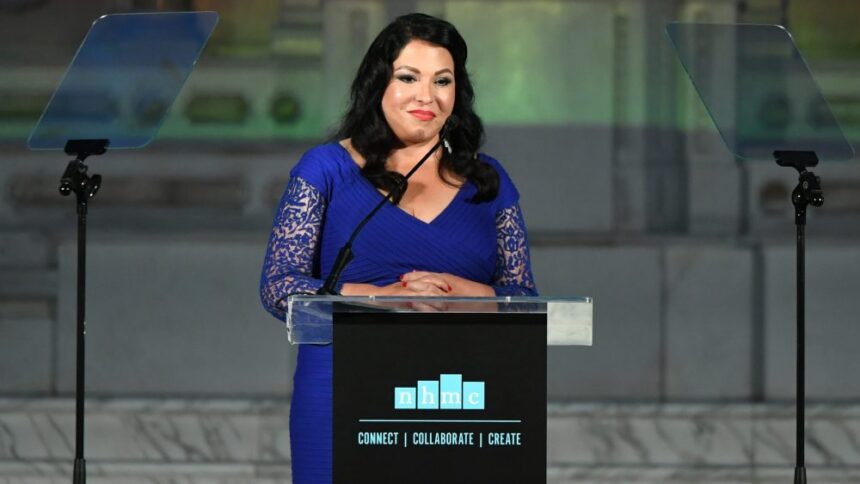The National Hispanic Media Coalition is mounting a campaign to educate Hollywood leaders about the economic value of the Latino audience as well as the need to bring more Latinos into senior roles at all levels of entertainment.
The NHMC, the nearly 40-year-old Washington, D.C.-based advocacy group led by Brenda Victoria Castillo, has published a 32-page guide designed to be a roadmap for the entertainment industry. Actor Gabriel Luna is among the prominent Latino talents who is supporting NHMC’s initiative. Castillo is about to make the rounds with senior executives in media and entertainment to press them on the lack of progress for Latinos, particularly in the executive suites.
After many years in the trenches as an advocate, Castillo believes there is a high level of misunderstanding about the Latino community.
“I personally will facilitate private, custom-designed sessions tailored to top executives,” Castillo tells Variety. “In other words, creating a safe space so they can ask those questions that they’re somewhat fearful to ask. I do want to have authentic conversations with the higher-ups. Really, NHMC is here to connect and collaborate. We’re here to ask the industry to join us to create positive change.”
RELATED CONTENT: Latino Advocacy Groups Vow to ‘Get Loud’ in 2023
The NHMC’s guide lays out issues that have been so persisent in front of the camera for Latino actors and behind the camera for other creatives. It also addresses the woeful lack of Latino representation in decision-making roles at major networks and studios. Luna, known for the “Ghost Rider” film series as well as his latest role on HBO’s “The Last of Us,” draws on his own experience to make the case that Latinos have been unjustly excluded from opportunities, even with the enormous increases in TV series and film output around the world in recent years.
Luna hopes that the guide will help those in power recognize this disconnect. The guide even has a section that addresses the confusion around the term “Latinx” versus “Latino” or “Latine.”
“The idea is to inform the executives and people who are going to take in this information as to how to approach the many different identities within our community,” Luna tells Variety. “It’s not all doom and gloom. It shows where we’ve had our successes and shows where we’ve had our triumphs and what has been successful.”
Luna notes that he has been fortunate to have a range of creative opportunities that have only expanded as his career progressed. At present he is a co-star of HBO’s Emmy-nominated drama series “The Last of Us” alongside Pedro Pascal. The NHMC guide cites the UCLA Hollywood Diversity Report stats showing that less than 5% of TV series in the 2021-22 season had Latino lead actors.
“In this new season I sat with a young actress, Isabela Merced, who was just floored by the fact that she was in a room the other day with four Latino actors,” Luna said. “And nobody was playing the bad guy. Everybody was playing a very complex character with real depth.”
The guide offers examples of racists tropes and stereotypes that have been persistent for Latino characters in mainstream film and TV. Top of that list: portraying Latino characters as gang members, drug cartel leaders and criminals. No. 2 is featuring Latinos in “roles with limited or no dialogue.” No. 3 is “characters in service or subservient roles.”
The guide also uses industry ratings and box office data to underscore the importance of Latino audiences.
“Latines are avid media consumers, buying more movie tickets and subscribing to more online streaming services and video-on-demand than any other group. The audience is there, and it’s time for the industry to catch up,” the guide states. “We need greater authenticity in storytelling, more representation from the screen to the writer’s room, and a commitment from the industry to learn and do better. Through original storytelling, the opportunities for garnering greater audiences and positively impacting the lives of our community are endless.”
Castillo is well aware that the NHMC is not the first advocacy group to bring a report to entertainment leaders in the pursuit of progress. But there is great urgency because of the political and cultural turmoil that the U.S. faces around diversity and inclusion issues, immigration policy and the shocking level of racially-motivated crime.
“The decisions that are made in Washington, D.C. affect entertainment Hollywood, and then the way Hollywood decides to portray my community is the way we’re perceived by the public. And it’s this vicious cycle. One of the reasons we’re releasing it right now is because this is an election year. And they have dehumanized my community. They have dehumanized not just my community but all immigrants.”
Castillo, Luna and others feel that now is the time to make an educational push because the entertainment industry itself is in the midst of dramatic transformation.
“I just want to get in the room with the top people that make decisions,” Castillo said. “I’m really excited about this media guide. I think we can break through.”
(Pictured: Brenda Victoria Castillo, president and CEO of National Hispanic Media Coalition)











